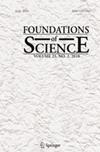扩展模型语言,处理人工智能中的纠缠概念
IF 0.9
4区 哲学
Q2 HISTORY & PHILOSOPHY OF SCIENCE
引用次数: 0
摘要
在量子信息和计算中,纠缠是一种资源。在结合概念时,在微观物理系统之外应用纠缠是一种有用的工具。我们提出了无需翻译的基于认知图像的新测试。无需事先了解与概念相关的术语,因此选择更加直观。我们研究了建立非经典统计相关性的两个概念的合并,并提出了一种纠缠感知向量编码算法。这项研究的附加值体现在一个自动系统上,它可以教人工智能识别和处理纠缠概念。本文章由计算机程序翻译,如有差异,请以英文原文为准。

Extending a Model Language to Handle Entangled Concepts in Artificial Intelligence
In quantum information and computation, entanglement is a resource. When combining concepts, the application of entanglement outside of micro-physical systems is an useful tool. We suggest new cognitive image-based tests that do not need to be translated. No prior knowledge of terms related to the concepts is required, therefore the choice is more intuitive. We examine the merging of two concepts that establish non-classical statistical correlation and present an entanglement-aware vector encoding algorithm. This research’s added value results in an automated system that teaches artificial intelligence to identify and handle entangled concepts.
求助全文
通过发布文献求助,成功后即可免费获取论文全文。
去求助
来源期刊

Foundations of Science
HISTORY & PHILOSOPHY OF SCIENCE-
CiteScore
2.60
自引率
11.10%
发文量
51
期刊介绍:
Foundations of Science focuses on methodological and philosophical topics of foundational significance concerning the structure and the growth of science. It serves as a forum for exchange of views and ideas among working scientists and theorists of science and it seeks to promote interdisciplinary cooperation.
Since the various scientific disciplines have become so specialized and inaccessible to workers in different areas of science, one of the goals of the journal is to present the foundational issues of science in a way that is free from unnecessary technicalities yet faithful to the scientific content. The aim of the journal is not simply to identify and highlight foundational issues and problems, but to suggest constructive solutions to the problems.
The editors of the journal admit that various sciences have approaches and methods that are peculiar to those individual sciences. However, they hold the view that important truths can be discovered about and by the sciences and that truths transcend cultural and political contexts. Although properly conducted historical and sociological inquiries can explain some aspects of the scientific enterprise, the editors believe that the central foundational questions of contemporary science can be posed and answered without recourse to sociological or historical methods.
 求助内容:
求助内容: 应助结果提醒方式:
应助结果提醒方式:


